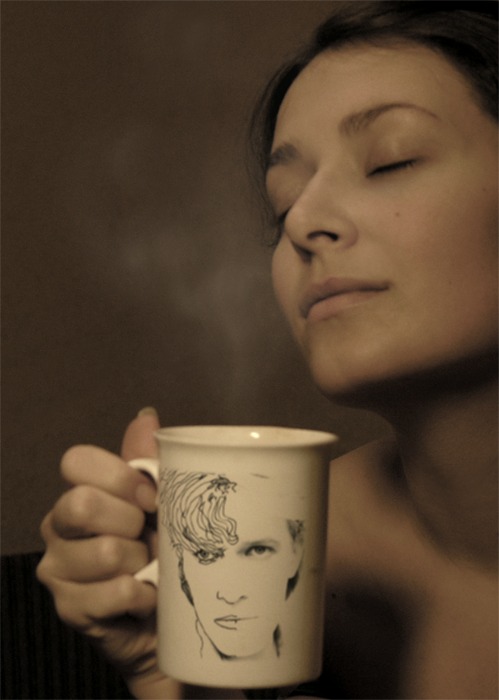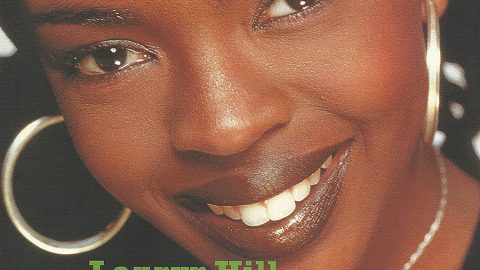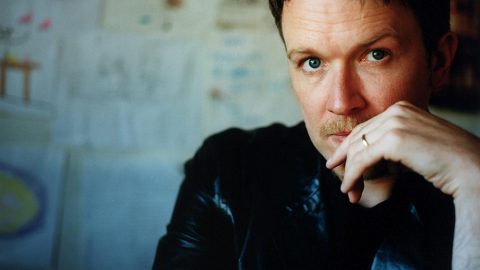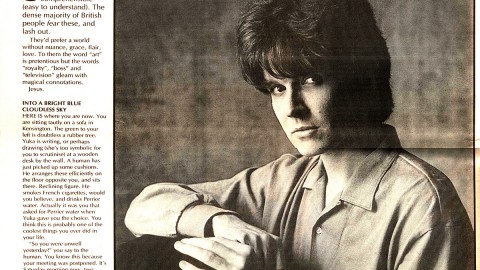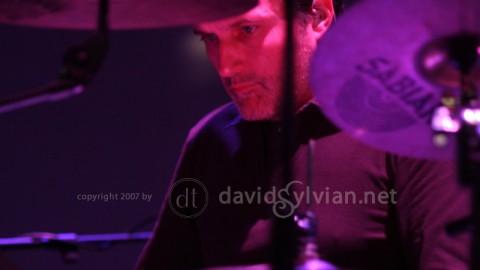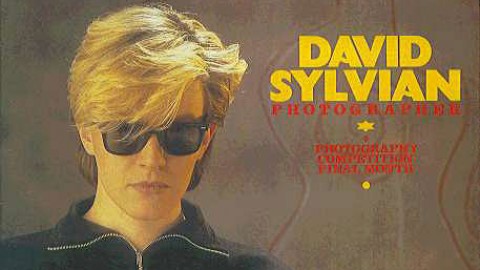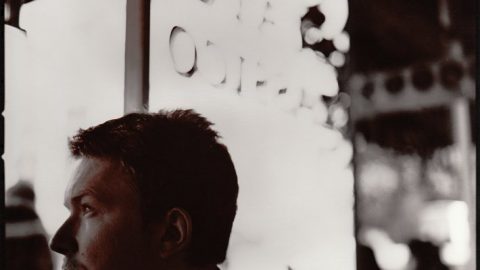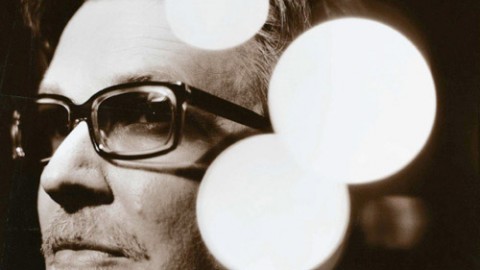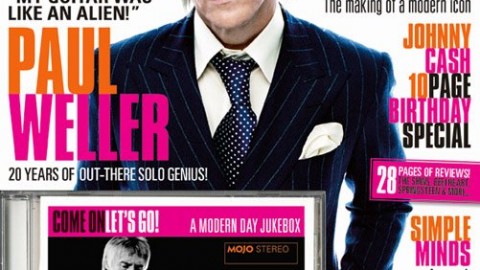The Art Of Noise by Ian Birch (Smash Hits, May 1984)
What’s David Sylvian been doing since Japan broke up?
Taking Polaroids, traveling, organizing an exhibition — oh and making a new record. “Art is my means of expression.” he tells Ian Birch.
“What have I been up to? I’ve been enjoying myself” smiles David Sylvian.
Come again?
“Well, partly enjoying myself” The smile explodes into a beam. Beneath that suave exterior nestles a flinty sense of humour. David’s back with a new package on offer There’s his first solo LP, “Brilliant Trees”, which should be out very soon. There’s a single “Red Guitar”, which like all good cheeses gets better with every nibble. It’s a soothing and stately performance which slowly reveals more and more hidden delights.
“It’s quite a good commercial for the album,” says David “‘Red Guitar’ symbolizes art in a way and art is my means of expression. The chorus just says, it’s my vice and my virtue. It’s something that will preoccupy my life and give it the most pleasure and the most pain. It’s that simple.” There’s also an exhibition of polaroids that Mr S. has taken over the last few years which opens on June 18 at London’s Hamilton Gallery (at 13 Carlos Place, W.1.) There’s an accompanying book (as yet untitled) which will be published in the next few months by his own company Opium (Arts) Ltd. Not bad for someone who confesses to be a profoundly “lazy” person.
But this period of activity took a long time coming. Talking about the last couple of years, he constantly uses phrases like “personal difficulties” and “a period of learning and self-discovery”. A lot of this uncertainty sprang from the break-up of Japan in 1982 which he describes as “probably the worst year” of his life. When you are as close to a project as David was to Japan, it’s collapse leaves you feeling horribly insecure and lonely. He decided not to write anything because he couldn’t separate himself from what he’d done with the group. He turned briefly to drawing and painting until he discovered the wonders of a Polaroid camera. He bought his camera while on a visit to Japan in ’82 to see brother Steve play with Yukihiro Takahashi. There everybody seemed to own a Polaroid and would frantically take pictures of everyone else (frantically taking pictures).
The Polaroid was a perfect solution. It’s easy to operate, exciting and gloriously instant. “I’m incredibly lazy with cameras,” laughs David, “because I never get the film developed. I’m a complete amateur in everything and that’s why I like the Polaroid” Anyone can use it and w
Why not? It’s the same with musical instruments. If it’s a live performance, I often can’t do it whereas if it’s in the studio I usually can.”
He started experimenting with the Polaroid, taking scores of self-portraits and then distorting them to find a variety of effects. One of these is “scratching” which is exactly the same principle that lies behind many disco records at the moment. “You take a pen or a blunt instrument and scratch the surface of the picture,” adds David. “The liquids inside move around the picture and you can create new patterns”.
Japan finally over, he spent a lot of time with his girlfriend Yuka Fujii in their topfloor London flat which happens to face an imposing old church.
One day he photographed a section of the church but it was so small that “it meant nothing”. He hit on the idea of a photomontage — a collection of polaroids. What interested him now was not what you see but how you take it and he spent weeks taking pictures of the church from different angles, at different times of day and in different lights. The result should be in that exhibition.
He began to listen to music again but none of it was pop. He became fascinated by jazz and classical works. “I always felt there’d be a time when I had time to appreciate classical music and it seemed to be that time. And jazz. That was mainly through Yuka’s influence.”
What’s more, the people he listened to were the people, he decided, he wanted to work with. They’re an international crew of musical oddballs – like trumpeter Jon Hassell, German experimentalist Holger Czukay, New York funk specialists Wayne Braithwaite and Ronnie Drayton plus his old Japanese chum Ryuichi Sakamoto.
It was ‘Ru’ (as David calls him) who snapped him back into making music. Sakamoto not only acted in, but also wrote the score for, the David Bowie film, Merry Christmas Mr Lawrence. He asked Sylvian to write lyrics for one of his pieces and Silvian just happened to have some words that coincided perfectly. The result? The excellent “Forbidden Colours” single.
“I thought it was such an important step for me that I said, now I’m ready to do something. The lyrics weren’t disguised as I’d done before. This was so obviously about myself and I achieved it in a way I’d never done before. Yes, I did it and I did it right.’.
He booked a studio in Berlin. “I thought the album should have more of a European feel than America. Berlin I felt was a neutral place to work. Everyone came to a place they were unfamiliar with so it was like an adventure,”
David’s idea was to act like a film director .Treating his songs like a loose script and letting the other musicians interpret them as actors would. They could add or take away but the important thing was that they didn’t take too long doing it. He wanted a lively improvisation that would capture very special performances.
Side One, he says, is “more jazzy, guitar-based and structured”; Side Two is “more ethnic, keyboard-based and more like pieces of music.” “It reminds you of places but you can’t pinpoint anyone in particular. It has the flavour of a mixture of cultures and that is the greatest achievement of this album”.
He’s in full flight. “Lyrically, I could say it’s a self-portrait but I know that would put so many people off. They think it’s based on ego rather than the value of discovering yourself. Actually, the lyrics are so personal that I really would feel embarrassed playing a couple of the songs in front of people. Even in the studio I felt a bit uncomfortable and that was with the people who played on it.
“The lyrics question a lot of things but without any answers. Religion crops up now and again. With ‘Forbidden Colours’ I felt a’ need, a pulling to be involved in some way, with the Christian religion. I don’t know why. It was very confusing.”
Sylvian has also discovered the wonders of nature. It was partly sparked off by recent visits to France, Switzerland and Nepal. “I think that Nepal did it because the feeling there was so strong and my enjoyment of it was so positive. “It’s hard to pinpoint but you feel an affinity with the environment that you’re in, You’re able to exist within it without yearning to be back in the city or with people. I wouldn’t know one tree from another. No, it’s just feeling something which is indescribable — a total peace within.”
David recalls some of those more peaceful moments. Like in Nepal when he and Yuka drove out of the city of Katmandu (“actually it’s like a dirt track full of wooden and mud huts and about three miles wide”) and into the surrounding countryside. “I can’t remember why we stopped — maybe it was a temple — but we walked along a hillside and I sat down under these trees and there was an extraordinary view that commanded the whole landscape”.
Again in Switzerland when they were staying among the mountains. “It was very hot and luckily off-season. Absolutely nobody was around. I was sitting on what do you call those things – a pier? “I was there for hours and over the lake were these blue mountains and I felt at peace.”
Does he ever do anything in these places? “Oh no. I think that’s moving too fast. The first thing is just to be there. Learning too much too soon is a bad thing. “When I go back to a country, I go back to the same place – the same restaurants and see the same people. That’s where you get the true experiences from. You only ever start learning about places after you’ve got bored with them.”
Sylvian isn’t bored with music at the moment. His batteries are recharged and there are plenty more plans in the pipeline. Like an EP of “uptempo, attacking music” and a “mainly instrumental” LP before a “possible tour” , early next year.
David grins. “As usual, I may do none of them as something else might take my interest. I’m terrible at that.”
(thanks to Marieke Dorr-van Swam for the article)

